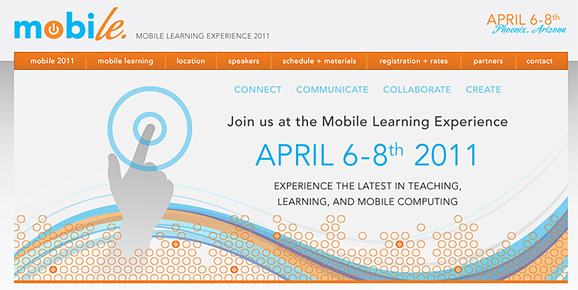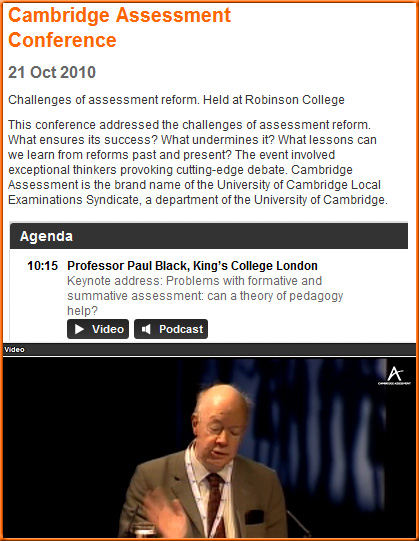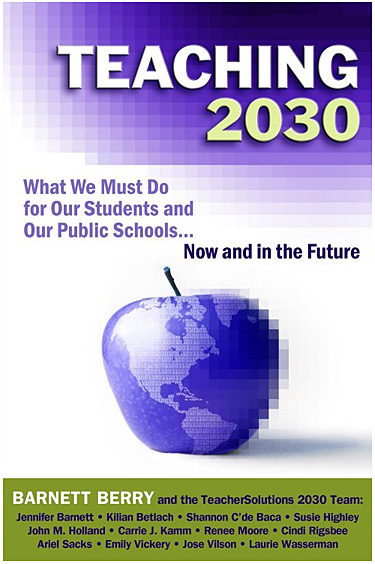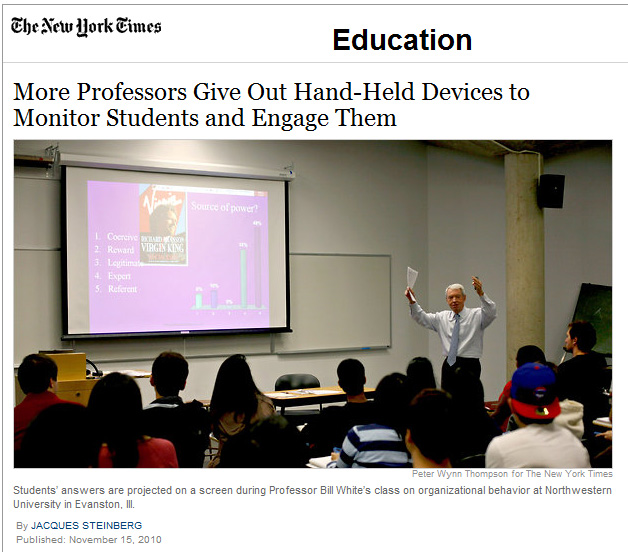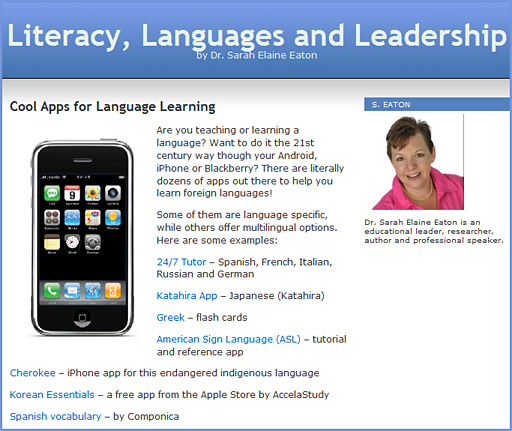School Tech: 6 Important Lessons From Maine’s Student Laptop Program — from Mashable.com by Sarah Kessler
.
Simon Lebus, Group Chief Executive, Cambridge Assessment
Welcome and introductory remarks
Video
PodcastProfessor Paul Black, King’s College London
Keynote address: Problems with formative and summative assessment: can a theory of pedagogy help?
Video
PodcastParallel discussion session A: ‘Governments come and go’
Educational reform and strategy in schools and colleges
Professor Jo-Anne Baird, University of Bristol
VideoParallel discussion session A: ‘Governments come and go’
Educational reform and strategy in schools and colleges
Professor Jannette Elwood, Queen’s University Belfast
VideoParallel discussion session A: ‘Governments come and go’
Educational reform and strategy in schools and colleges
Professor Jo-Anne Baird, University of Bristol
Professor Jannette Elwood, Queen’s University Belfast
PodcastParallel discussion session A: Qualifications, skills and employability: a peculiarly British obsession?
Dr. Geoff Hayward, University of Oxford
Video
PodcastParallel discussion session B: Why teacher assessment is not enough
Professor Peter Tymms, University of Durham
PodcastParallel discussion session B: Meeting the challenges of change in assessment systems: A Maltese perspective
Professor Frank Ventura, University of Malta
PodcastQuestions and discussion: Parallel session B
Podcast
Panel discussion chaired by Mike Baker, former BBC Education Editor.
Featuring: Dr Mary Bousted, Association of Teachers and Lecturers Professor Richard Daugherty, Cardiff University Isabel Nisbet, Ofqual Lord Sutherland of Houndwood Delegates are invited to submit questions prior to the conference and questions will also be taken on the day. To submit a question please email us: thenetwork@cambridgeassessment.org.uk.
Video
PodcastDr Philip Davies, Oxford Evidentia Limited
Hitting the target but missing the point
Video
PodcastTim Oates, Director, Assessment Research & Development, Cambridge Assessment
Closing remarks
Video
PodcastDelegates’ reaction
.
For another item related to assessment, see: Tests get high marks as a learning tool — from Anne McIlroy
Rubrics: The Essentials — from Faculty Focus by Maryellen Weimer in Teaching Professor
“Teaching with Rubrics: The Good, The Bad and The Ugly.” What a great title and the article is equally as good. For a quick review, rubrics, as this author points out, are most simply lists of criteria and levels of quality. (p. 27) What makes them good, bad, and ugly? Here’s a list condensed from the article.
Top 10 Faculty Focus Articles for 2010, part 1 — from Faculty Focus by Mary Bart
Top 10 Faculty Focus Articles for 2010, part 2 — from Faculty Focus by Mary Bart
In the raging controversy over the purpose of public education and how to fix the nation’s underperforming schools, the voices of America’s best teachers are seldom heard. Now for the first time, in a provocative book about the future of teaching and learning, 12 of America’s most accomplished classroom educators join a leading advocate for a 21st-century teaching profession to bring expert pedagogical know-how and fresh and provocative policy ideas to the national school reform debate. Together they identify four emergent realities that will shape the learning experience of children born in the New Millennium — and propose six levers of change that can ignite a bright future for our nation’s students by ensuring they all have access to excellent teaching. To create the public schools all students deserve, today and tomorrow, the authors call on policymakers and the public to work with teachers in creating a dynamic and flexible learning environment for students and teachers, and powerful new ways to define and measure school success; transforming public education through digital technologies while reinventing brick and mortar school buildings into 24/7 hubs of community support for students and families; re-imagining teaching as a well-compensated career with many pathways, assuring that every child has qualified and effective teachers and that teaching expertise is constantly spread, in and out cyberspace; establishing a new leadership force of 600,000 teacherpreneurs — classroom experts who continue to teach students regularly while also serving as teacher educators, policy researchers, community organizers, and trustees of their profession.
Teaching 2030 provides a refreshing, grounded, and lively examination of what we need to know and do in order to ensure that every public school student in America has access to qualified, caring, and effective teachers.
About the Author
Barnett Berry is founder and president of the Center for Teaching Quality, based in North Carolina–a nonprofit that seeks to dramatically improve student achievement nationwide by conducting timely research, crafting smart policy, and cultivating teacher leadership. The TeacherSolutions 2030 Team includes Jennifer Barnett (Alabama); Kilian Betlach (California); Shannon C’de Baca (Iowa); Susie Highley (Indiana); John M. Holland (Virginia); Carrie J. Kamm (Illinois); Renee Moore (Mississippi); Cindi Rigsbee (North Carolina); Ariel Sacks (New York); Emily Vickery (Florida); Jose Vilson (New York); Laurie Wasserman (Massachusetts).
The Coming Age of the Teacherpreneur — from edweek.org by Barnett Berry & the TeacherSolutions 2030 Team
In an excerpt from a forthcoming book on the future of education, a group of accomplished educators envisions new roles for teacher leaders.
Excerpt:
Ultimately, teacherpreneurship is about propagating a new culture of innovation and creativity in a sector of education that has been woefully lacking in one. Most importantly, teacherpreneurship is not promoting a free-market vision for the profit of a few—but rather how our society can invest substantially in teachers who can expertly serve millions of children and families who are not in the position to choose a better school somewhere else or find the most erudite online teacher anytime, anywhere. Teacherpreneurship is all about the public good, not private gain.
One simple thing — from November Learning
“As a former teacher and current learning consultant and parent of two school-aged children, my experiences tell me that clear and regular communication with families is really important. This may seem like a no-brainer, but in this day and age, it’s even more essential. Busy families rely on technology, particularly cell phones, for communication, and papers tend to get lost in the household shuffle.”
Some excerpts:
Though the technology is relatively new, preliminary studies at Harvard and Ohio State, among other institutions, suggest that engaging students in class through a device as familiar to them as a cellphone — there are even applications that convert iPads and BlackBerrys into class-ready clickers — increases their understanding of material that may otherwise be conveyed in traditional lectures.
The clickers are also gaining wide use in middle and high schools, as well as at corporate gatherings. Whatever the setting, audience responses are received on a computer at the front of the room and instantly translated into colorful bar graphs displayed on a giant monitor.
Professor White acknowledged, though, that the clickers were hardly a silver bullet for engaging students, and that they were just one of many tools he employed, including video clips, guest speakers and calling on individual students to share their thoughts.
“Everyone learns differently,” he said. “Some learn watching stuff. Some learn by listening. Some learn by reading. I try to mix it all into every class.”
Many of Professor White’s students said the highlight of his class was often the display of results of a survey-via-clicker, when they could see whether their classmates shared their opinions. They also said that they appreciated the anonymity, and that while the professor might know how they responded, their peers would not.
Teaching strategies that help students learn how to learn — from FacultyFocus.com by Sara Coffman
Questions I’m no longer asking — from elearnspace by George Siemens
Excerpt:
I’m firmly convinced of the following:
1. Learners should be in control of their own learning. Autonomy is key. Educators can initiate, curate, and guide. But meaningful learning requires learner-driven activity
2. Learners need to experience confusion and chaos in the learning process. Clarifying this chaos is the heart of learning.
3. Openness of content and interaction increases the prospect of the random connections that drive innovation
4. Learning requires time, depth of focus, critical thinking, and reflection. Ingesting new information requires time for digestion. Too many people digitally gorge without digestion time.
5. Learning is network formation. Knowledge is distributed.
6. Creation is vital. Learners have to create artifacts to share with others and to aid in re-centering exploration beyond the artifacts the educator has provided.
7. Making sense of complexity requires social and technological systems. We do the former better than the latter.









